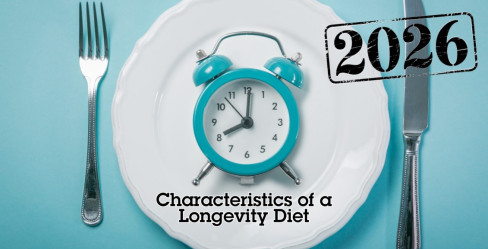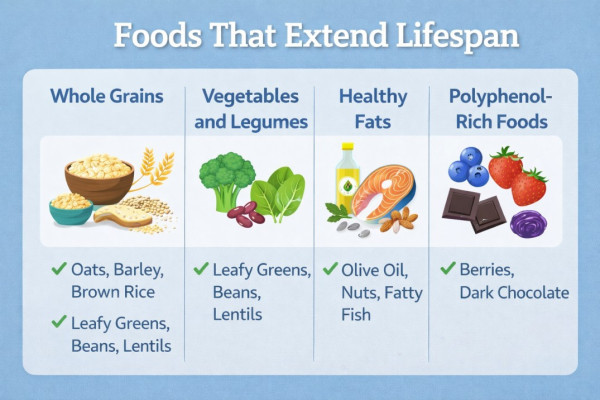What Is the Optimal Diet for Longevity? A Science-Backed Guide

By Brent | Last Updated: February 19th, 2026
What Is the Optimal Diet for Longevity?
The longevity space is often dominated by futuristic therapies, biotech funding rounds, and speculative breakthroughs. But beneath all of that sits a more immediate and accessible lever: diet.
Nutrition remains one of the most powerful tools we have today to influence aging, disease risk, and long-term health. The challenge isn't whether diet matters. It's separating evidence-based principles from noise, marketing, and dietary extremism.
Recent large-scale reviews of aging research suggest that longevity diets share consistent characteristics across populations, species, and study designs. These patterns are not trendy. They are pragmatic, flexible, and rooted in biology.
Key Takeaways
> Longevity diets emphasize whole, minimally processed plant foods.
> Protein intake should be moderate and context-dependent.
> Healthy fats play a central role in metabolic health.
> Meal timing and fasting influence aging pathways.
> There is no single perfect diet, but common principles recur across long-lived populations.
What Is a Longevity Diet?
A longevity diet is not a rigid meal plan. It is a set of dietary principles designed to reduce age-related disease risk, support metabolic health, and slow biological aging.
Rather than optimizing for short-term weight loss or performance, longevity diets focus on:
> Inflammation control
> Insulin sensitivity
> Cellular repair
> Long-term cardiovascular and cognitive health
These diets are informed by both epidemiological data from long-lived populations and mechanistic studies of aging biology. For a broader framework on how diet fits into the longevity picture, see our guide to longevity.
Quick Answer: A longevity diet emphasizes whole plant foods, healthy fats (especially olive oil), moderate protein, and time-restricted eating. It limits processed foods, added sugars, and excessive red meat. The goal is reducing inflammation, improving insulin sensitivity, and activating cellular repair, not rapid weight loss.
What Are the Core Principles of a Longevity Diet?
Large reviews of nutrition and aging research, including work led by Valter Longo and colleagues published in Cell (2022), identify recurring features associated with longer lifespan and healthspan.
These principles are not extreme and intentionally avoid dietary dogma.
Which Foods Are Linked to a Longer Lifespan?
Longevity-supportive diets consistently emphasize:
Whole Grains
Oats, barley, brown rice, and other intact grains support glycemic control and gut health. These foods help maintain stable blood sugar, something you can track with a continuous glucose monitor if you want objective feedback.
Vegetables and Legumes
Leafy greens, cruciferous vegetables, beans, and lentils provide fiber, micronutrients, and phytochemicals linked to lower mortality. Fiber also feeds beneficial gut bacteria, which influences longevity through the gut-brain axis.
Healthy Fats
Olive oil, nuts, seeds, and fatty fish contribute to anti-inflammatory signaling and cardiovascular resilience. Extra virgin olive oil in particular is a cornerstone of Mediterranean-style eating patterns.
Polyphenol-Rich Foods
Foods like berries, dark chocolate, and certain vegetables may support cellular stress resistance. However, some combinations can reduce polyphenol absorption, preparation matters.
Together, these foods provide energy while minimizing metabolic strain.

Which Foods May Shorten Lifespan?
Research repeatedly associates higher mortality risk with diets high in:
Refined Grains
White bread, pastries, and processed cereals contribute to insulin resistance. These foods spike blood glucose and provide minimal nutritional value.
Added Sugars
Excess sugar intake accelerates metabolic dysfunction and inflammation. For strategies on reducing inflammatory load, see our guide on beating inflammation for anti-aging.
Red and Processed Meats
Higher intake is linked to increased cardiovascular and cancer risk. This doesn't mean elimination, but frequency and portion size matter.
Ultra-Processed Foods
These often combine poor nutrient density with high caloric load. Many also contain additives that may damage DNA and accelerate aging.
Limiting these foods does not require elimination, but moderation matters.
Does Fasting or Time-Restricted Eating Support Longevity?
Longevity research increasingly focuses on when we eat, not just what we eat.
Common findings suggest benefits from:
> Eating within an 11–12 hour daily window
> Allowing a consistent overnight fasting period
> Periodic short fasting cycles in select individuals
These patterns may improve insulin sensitivity, reduce inflammation, and activate cellular repair pathways like autophagy without continuous caloric restriction.
Intermittent fasting is one practical implementation. The key is consistency over perfection, a 12-hour overnight fast is more sustainable than aggressive protocols for most people.
How Much Protein Is Ideal for Longevity?
Protein is essential, but longevity research highlights nuance.
> Excessive protein, especially from animal sources, may activate growth pathways linked to aging (particularly IGF-1 signaling).
> Moderate protein intake, largely plant-based, appears protective in midlife.
> Older adults (65+) may benefit from higher protein intake to preserve lean muscle mass.
Protein needs change with age, health status, and activity level. Our ultimate guide to protein for longevity breaks down the research in detail.
How Does the Longevity Diet Work?
Longevity diets influence aging through several mechanisms:
> Reduced insulin and IGF-1 signaling
> Lower chronic inflammation
> Improved mitochondrial efficiency
> Enhanced cellular repair and autophagy
Rather than targeting a single pathway, these diets create an environment where aging progresses more slowly. Some of the same pathways are targeted by compounds like rapamycin and metformin, but diet remains more accessible and better studied in humans.
What Are the Health Benefits of a Longevity Diet?
Observed and proposed benefits include:
> Lower cardiovascular disease risk
> Reduced incidence of metabolic disorders
> Improved cognitive resilience
> Better weight regulation over time
These effects compound over decades rather than producing rapid results. Tracking progress through blood panel testing can help you see whether dietary changes are moving your biomarkers in the right direction.
Can the Longevity Diet Help You Lose Weight?
Weight loss may occur, but it is not the primary goal.
Longevity diets tend to:
> Reduce caloric density
> Improve satiety
> Normalize metabolic signaling
Weight changes are a side effect, not the objective. If weight management is a primary concern, newer interventions like GLP-1 agonists are showing promise for both weight and metabolic health.
What Does a Sample Day of Longevity Eating Look Like?
A typical day might include:
Breakfast: Oats with nuts, berries, and olive oil
Lunch: Lentil and vegetable bowl with whole grains
Dinner: Vegetables, legumes, and small portions of fish
Eating window: Late morning to early evening
Flexibility matters more than precision. A post-meal walk can further improve glucose response after meals.
Which Longevity Diet Foods Should You Eat After Age 50?
After midlife, priorities shift toward:
> Preserving muscle mass
> Supporting bone health
> Managing insulin sensitivity
This often means:
> Slightly higher protein intake (see our protein guide)
> Continued emphasis on whole foods
> Avoiding extreme restriction
NAD+ precursors and other longevity supplements may complement dietary strategies, though food remains the foundation.
Should You Personalize a Longevity Diet Based on Your Needs?
No single diet works for everyone.
Longevity diets should be adapted based on:
> Genetics
> Health conditions
> Age
> Lifestyle demands
This is where biomarkers and individualized feedback become valuable. Working with a longevity-focused physician can help you interpret data and adjust protocols. What improves one person's healthspan may be neutral or harmful to another.
The balance between lifestyle and genetics varies by individual, but diet is the lifestyle factor most people can control immediately.
Final Thought
Longevity diets are not about perfection. They are about direction.
Small, consistent dietary shifts, sustained over decades, may do more for lifespan and healthspan than any single supplement or breakthrough therapy.
Start with what you can sustain. Build from there.
FAQs about Optimal Longevity Diet
What is the healthiest diet for longevity?
Diets rich in whole plant foods, healthy fats, and minimal processing consistently support longevity. Mediterranean-style patterns have the strongest evidence base.
What is the #1 diet for a long, healthy life?
There is no single best diet, but Mediterranean-style patterns repeatedly rank highest in longevity research.
What foods should I avoid for longevity?
Highly processed foods, added sugars, refined grains, and excessive red meat. See our list of foods that damage DNA for specifics.
How much protein should I eat for longevity?
Moderate intake, adjusted for age and activity level, is generally recommended. Our protein for longevity guide provides detailed recommendations.
Does fasting help you live longer?
Time-restricted eating and occasional fasting may support longevity pathways like autophagy. The evidence is strongest for consistent overnight fasting periods.
Is a longevity diet the same as a Mediterranean diet?
They overlap heavily, but longevity diets place greater emphasis on protein moderation and fasting timing.
Can I drink coffee on a longevity diet?
Moderate coffee consumption appears compatible with longevity-focused eating, and may even provide benefits.
Can I drink alcohol on a longevity diet?
Research on alcohol and longevity is mixed. Low-to-moderate consumption may be acceptable, but the trend is toward less being better.
About the Author
Sign Up For Our Newsletter
Weekly insights into the future of longevity
